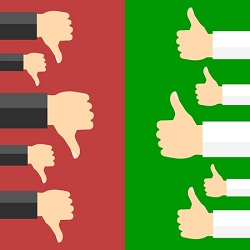How One Restaurant Handled Their Bad Yelp Review
Online reviews aren’t just a useful way to find a great place to eat, or to choose a hotel to stay at – they have also become a critical part of how businesses get new customers. As part of our continuing exploration of ethics in the online and digital age, we take a look at one restaurant’s story of a bad review, how they handled it, and what it means.
Voltaire, a Kansas City, Missouri restaurant recently had one bad review on the review platform Yelp go viral. The bad review came from a customer who felt snubbed when they were denied a takeout order. The reviewer wrote a long story about being in a late meeting across the street and wanting food to pick up. This reviewer claimed that she was snubbed and told there was no pick up service even though she had seen food being taken out before. The reviewer ended her review with a jab at the manager who had taken her call: “So thanks, Jamie, we’ll just starve.”
In this situation, many businesses would tread lightly. Restaurants are especially vulnerable to the impact of bad reviews, and this one-star rant could have done some real damage. While many would have moved past it and hoped that no one would notice, Voltaire stood up for itself.
William G., Voltaire’s owner, explained a few of the complaints in a detailed response. “Being a Yelp user, I’m sure you were aware that on our Yelp business page, on the right side of the screen, it lists details about our establishment. There is an item listed ‘Take-out: No.'” He explained practical reasons for why they prefer to only serve in the dining room, in order to exercise greater control over the quality of the food served, and explained the difference between letting dining room guests take home leftovers in takeout containers, and serving food curbside.
The owner went on to make a point about the inappropriate nature of making light of starvation.
Reading the whole exchange paints the best picture, and offers a chance to discuss a few key concepts:
- Online reviews have empowered anyone to leave their thoughts…for better or worse. When an uninformed customer registers a complaint against a business for something they assume the business provides (even if the business does not), they can cause real harm. Do online reviewers have a responsibility to inform themselves and do research before leaving a review, just like a professional would?
- In this exchange, the reviewer threatened the business with a bad review on the phone as a way of trying to get what they want. This clearly demonstrates the power of these reviews, while also asking the question: is it right to threaten a bad Yelp (or other) review to get your way?
- While many businesses are afraid to confront bad reviews and simply hope for the best, in Voltaire’s case, the restaurant fought back. Do you think that this sort of back and forth exchange and clarification is a positive thing for online reviews?
In the end, is this bad review a form of cyberbullying? As with many issues in the digital ethics realm, these sorts of occurrences seem to be made simpler and more frequent by the relative anonymity of the Internet. The fact that it is easier and less confrontational to say something mean online does not make it acceptable, and we must try to conduct ourselves with high standards whether we are online or offline.
Discuss guidelines for online behavior that take into account the power of the things we do online that can hurt, or help, other people.
For further discussion of moral questions related to online reviews, see our posts, “The Morality of Hotels Fining for Bad Reviews” and “Stay True to Your Online Review?.”













No Comment